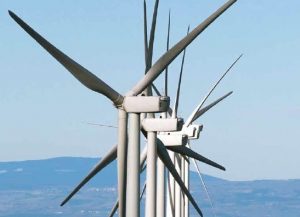Siemens has confirmed its objective to become one of the world’s top providers of wind turbines. Siemens entered the wind power market five years ago with its acquisition of Denmark’s Bonus Energy. Since then wind power operations at Siemens have undergone rapid development. The workforce has grown sevenfold, while revenue has actually increased tenfold. “This is a success story whose narrative we wish to continue,” says Andreas Nauen, CEO of the Wind Power Business Unit. “The overall global wind power market is growing at 12 percent annually. We intend to significantly outpace the market growth to become one of the top three providers by 2012.”
Siemens’ strategy will be to strengthen its position as a global market leader in offshore wind farms while expanding its international production network in key markets and ensuring technology leadership, for example gearless and floating wind turbines, with innovative products. “Wind power has excellent perspectives,” he continues. “The global wind power market will grow from about EUR30 billion annually today to more than EUR200 billion by 2030. We anticipate especially robust growth in the Asia-Pacific region. The market growth in North America and Europe, however, will also be significant.”
Offshore wind farms are playing an increasingly important role. The potential for offshore wind power in Europe is estimated at around 70 gigawatts, about half of the power plant capacity currently installed in Germany. At present only 1.5 percent of that is being utilized. In the past fiscal year Siemens secured the largest offshore wind power contract ever granted: to provide Dong Energy with 500 turbines of the 3.6-megawatt class. Some of these turbines will be used in the London Array, which will be the world’s largest offshore wind farm when it is complete. To date, Siemens has realized 10 offshore wind farms with a capacity of 850 megawatts. Contracts from Germany include the offshore wind farm Baltic 1. Siemens is also successful in the onshore wind power market. In the past fiscal year, for example, Siemens secured contracts for six wind farms in North America and for Europe’s largest onshore wind farm in Scotland. Recent orders have come from Mexico and New Zealand.
Siemens Wind Power has pursued a consistent strategy of further expanding its international production network in key markets. After establishing a rotor blade production plant in Fort Madison, Iowa, Siemens recently began construction on a new nacelle production facility in Hutchinson, Kansas. And in 2010 a plant outside of Shanghai will commence production of rotor blades and nacelles. Production is also planned in India.
Siemens relies on innovative products to ensure its future success. In early December 2009 Siemens completed the prototype of its newly developed gearless wind turbine, which promises even higher availability than standard wind turbines with about half the number of parts. Siemens is also working with StatoilHydro to promote the innovative Hywind project. Hywind is a floating wind turbine that can be positioned in waters from 120 to 700 meters in depth. This opens up new opportunities for offshore wind power.
Siemens Wind Power currently has a record order backlog of EUR6 billion. Over 8,000 wind turbines are in operation worldwide with a capacity of more than 9,600 megawatts. Together they make an important contribution to protecting our climate by saving over 20 million metric tons of CO2 emissions annually. The Business Unit Wind Power is part of the Renewable Energy Division of Siemens, which also includes photovoltaics and solar thermal power plants. Learn more at www.siemens.com/energy.

























